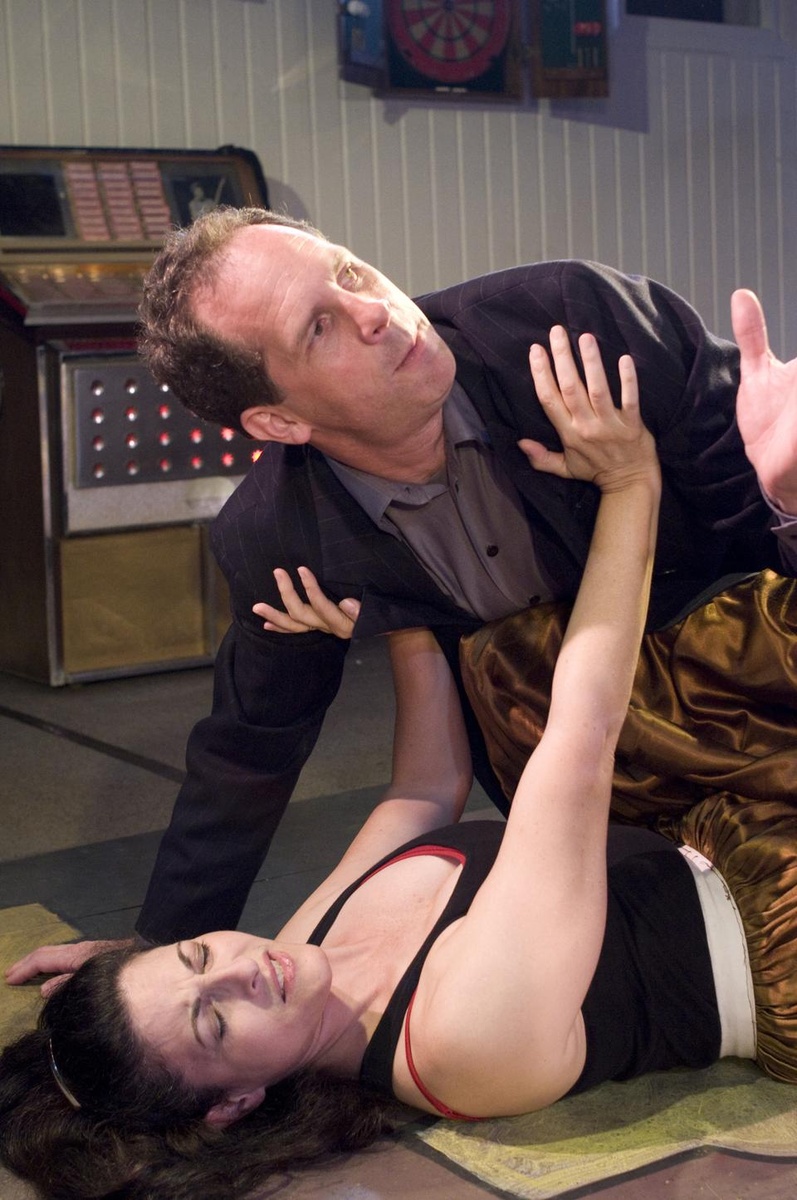The Wild Cat, a new bar in the basement of The Garage on JFK Street, has recently been serving up some extremely unusual fare. Until November 15, this dingy little watering hole will be home to “The Taming of the Shrew,” the most recent production by the Actors’ Shakespeare Project. This fictional bar acts as the backdrop for Shakespeare’s famous battle of the sexes, directed by OBIE-award winner Melia Bensussen.
While productions of “The Taming of the Shrew” traditionally focus on the play’s portrayal of gender stereotypes and the domestication of women, what intrigues Bensussen about the show is the idea of transformation. In the director’s notes, she writes, “Within the world of ‘Shrew,’ everyone is playing at what they are not, and class, as well as gender, are exposed as performances in which performer and viewer are complicit.”
Yet with all this emphasis on themes of change, the end product somehow seems stagnant throughout most of the evening. Bensussen uses Shakespeare’s lesser-known induction to the play as a sort of meta-theatrical framing device. This prelude to the show drops us into a typical bar atmosphere, complete with pretzels. A drunk stumbles in off the street, and the staff of the Wild Cat decides to play a prank on him, invoking the help of a drunken entourage who are forced to act out a play as punishment for not paying their tab.
Thus begins the actual story of “Shrew.” Bensussen manipulates this play-within-a-play trope to great success for the majority of the opening scenes. The actors take on their roles with the delightful awkwardness of children in a school play—scripts in hand, direction shouted at them mid-scene, and endearingly over-the-top line readings. Yet as the show progresses, the actors become more comfortable in their roles, and the production shifts from a clever tongue-in-cheek commentary on social performativity into a relatively normal presentation of Shakespeare’s play. The irony of this “Shrew” is that the better the acting gets, the worse the show becomes.
The biggest mistake with this production lies in the fact that Bensussen’s greatest innovation is a technique for framing the show—not for staging the show. This meta-theatricality is not enough to sustain a two-and-a-half hour production, and once the actors lose their scripts and take their roles on more fully, problems abound. The barroom décor no longer makes sense. Actor Ross Bennet Hurwitz is left in drag in the role of Bianca for the whole show, an odd move that seems to invite the audience to find gender commentaries in a production that claims to preference other themes. But beyond all else, we are left with a relatively plain production of “Shrew” that, despite some charming directorial flourishes from Bensussen, falls flat.
The production claims to conjure the ragged, gruff spirit of a bar, but it consistently fails to do so. In his introduction to the play, ASP Artistic Director Allyn Burrows invites the audience to “Get in, sit down, shut up, and hold on!” Yet even Kate, Shakespeare’s famous anti-heroine, feels oddly timid. Poorly executed fight choreography abounds, such as Kate’s unconvincing knee-to-the-crotch and the lame food fight which opens the second act. By that point, it feels as if the titular “shrew” has already been tamed. What’s left to watch after that?
The design elements in the show do little to help the audience engage with the production. As mentioned, the scenery is mostly just barroom décor completed by a totally inexplicable jigsaw pattern painted on the floor. The lighting has a few select moments where it explicates the atmosphere of a scene, but otherwise it does little to aid the drama at hand. The sound is a dismal effort, relying largely on tacky, cartoonish underscoring that reduces the tone of any given scene to garish musical stereotypes.
The acting is consistent, with a few standout performances. Benjamin Evett does admirably as both the drunken Christopher Sly and Petruchio, the conniving, arrogant man who weds Kate against her will and then domesticates her. He plays the obnoxious male bravado of the role to perfection, but again, this directorial move seems to invoke the ideas of gender relations in the play above themes of transformation. Beyond that, the casting (which includes eight men and only one woman, playing Kate) seems to play towards the gender themes as well. Bensussen may have been intrigued by Kate’s transformation rather than the conflict of genders, but the production itself certainly does not reflect that.
At the heart of ASP’s “The Taming of the Shrew” is an uninspiring staging of Shakespeare with one novel idea that runs out of steam before the action really starts. The production begins as a smart, entertaining, and stimulating evening of theater, but it quickly loses its way. While it has some redeeming qualities and moments throughout, this performance simply feels lackluster. You could pay a visit to the Wild Cat this coming week, but, frankly, your money would be better spent at a real bar.
Read more in Arts
Pointe of Departure













